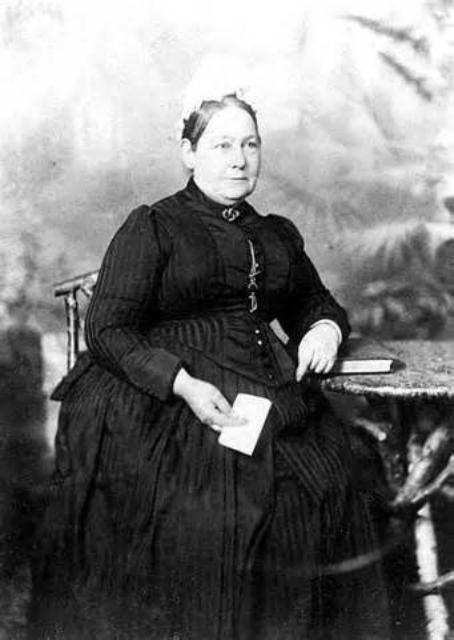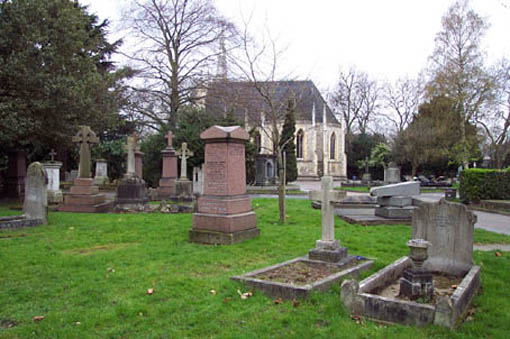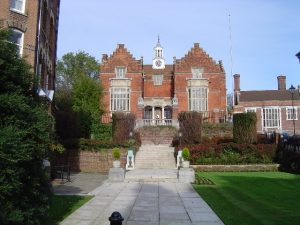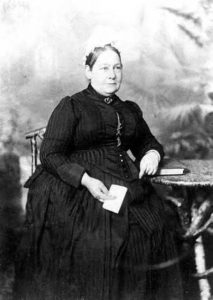Finest Hour 175
“100 000 Kisses”: The Woman Who Raised Winston Churchill

April 4, 2017
Finest Hour 175, Winter 2017
Page 10
By Katherine Barnett
Sir Winston Churchill is often said to have had an emotionally deprived childhood, with his distant mother and scolding father. It is an easy picture to paint, but to do so ignores the role played by the woman who became his closest companion, Mrs. Elizabeth Everest. Known to Winston by a variety of names including “Woomany” and “Oom” (from his infantile efforts to pronounce “woman”), she was the person with whom he formed the strongest emotional attachment of his childhood and into adulthood became his “dearest and most intimate friend.”
Winston was a very affectionate boy, and letters to Mrs. Everest are signed off with “100 000 kisses,” whilst those to his parents are filled with doubly-underlined requests for his nanny to come visit and telling stories of the adventures they had together. When Winston was just eight years old, a letter to his father recalls a day walking with Mrs. Everest when they saw a snake crawling in the grass. Winston had wanted to kill it, but Mrs. Everest would not allow it and encouraged Winston to let the snake carry on about its day.
To understand the strength of their connection, an example presents itself in March 1886. Winston was eleven and had contracted pneumonia with a temperature of 104.3°, firmly putting his fever in the “dangerous” bracket. He showed signs of delirium and exhaustion, with an alarmingly quick pulse. The doctor wrote to Churchill’s mother, saying that his right lung was struggling and his left lung was starting to feel the strain of the extra work. He was watched by nurses around the clock, and concerns were so grave that the doctor wrote to Lady Randolph Churchill, saying that Winston needed to rest and expressed concern that, should Mrs. Everest visit, Winston’s excitement at seeing her would be so great that it might do harm and worsen his condition. At the time, Mrs. Everest was far away but was anxiously waiting for word as to when she might be able to visit. We know from Winston’s own letters to her at this time that he was desperately unhappy, saying, “I am feeling very weak. I feel as if I could cry at everything.” It is telling that during his illness the person he most desperately wanted to see was Mrs. Everest, and saddening that she was the only person who, on medical advice, was not permitted to see him.
Close Bond
It is unsurprising that the pair formed such a close bond. Everest had been with the Churchills since Winston’s infancy and travelled to Dublin with the family when Winston’s grandfather, the seventh Duke of Marlborough, was appointed Viceroy of Ireland, with Lord Randolph as his private secretary. She stayed with the Churchills on their return to England. As well as offering early instruction in reading and writing before a governess was hired, she would accompany Winston and his brother Jack on their childhood adventures, collecting flowers, chasing butterflies, and basking in the sunshine. It was probably during these summer days that Everest rhapsodised about the county of Kent in England, where she herself was born and spent her childhood years. This planted seed blossomed years later when Churchill purchased his much-loved home Chartwell, where his own children could grow up. Upon first sight, the house was an ivy-clad, derelict building with a leaking roof and reportedly little charm. Churchill, however, could see beyond this, and it was the panoramic views over the rolling Weald of Kent that captured his heart, harking back to Mrs. Everest’s own love of the county. Kent became his primary home for the rest of his life, and his Butterfly House—standing on the grounds to this day—undoubtedly brought back wonderful childhood memories.
Despite their closeness, adolescence naturally had an impact on their relationship. Mrs. Everest became more critical of Winston’s spending, which became the only subject the pair ever disagreed about. On one occasion, Everest intercepted a letter Winston had written to his mother asking for money, and added notes to Lady Randolph saying, “I do not think it wise to give him money to throw away.” This was one of a chain of correspondences between Winston and his mother about money that carried on well into adulthood, as both regularly experienced difficulties with finances. In one letter to her he remarked: “It seems just as suicidal to me when you spend £200 on a ball dress as it does to you when I purchase a new polo pony for £100. And yet I feel that you ought to have the dress & I the polo pony.” Everest continued to offer her “humble opinion” about his spending, including one instance where she chastised him for wanting to use his money to buy a bulldog instead of repairing his broken bicycle: “What on earth is the good of you having a bull dog [sic], unless it is to keep us all in terror of our lives…besides, His Lordship gave you the bicycle and he would not like you to part with it.” In the end, the bicycle was duly repaired, and the bulldog never appeared. These early references to Winston’s frivolous expenditure went on to echo throughout his life.
Meanwhile Winston began to show signs of breaking away from Everest, wanting to see his friends without her accompanying them, out of fear that his friends would see her presence as “babyish.” This coincides with his start at Harrow, undoubtedly with a growing sense of self-confidence following his excellent results in the entrance examinations, including coming first in History, English, Algebra, and Ancient History, as well as second in Geography and Arithmetic. Despite Winston’s keenness to impress his school friends, his affection for Mrs. Everest never diminished. On one Speech Day at Harrow, when neither of his parents was able to attend, it was Everest who went to support the schoolboy. In turn, Winston was so delighted to see her that he reportedly walked arm in arm with her around the town. The other boys sniggered at the pair, but Winston was deaf to the mockery and overjoyed that she had been able to join him on such an important day. Their friendship remained strong on both sides, with letters from Everest to Winston at this time referring to him as “my precious darling.”
Due Gratitude
Sadly, as always happens, the children eventually outgrew the need for a nanny, and, just before his seventeenth birthday, Winston learned that Mrs. Everest was to leave the family’s employ. He was outraged at the treatment of someone who had served them so loyally, and, following his protestations, arrangements were made for her to be made housekeeper at the house of his grandmother, Duchess Fanny, allowing both Winston and Jack to see her still. The pair remained close, but the solution was short-lived, and after two years it became apparent that Everest was surplus to requirements and would likely be dismissed from Duchess Fanny’s service also. Upon hearing this news, Winston wrote a letter out of “common decency” to his mother pleading with her to intervene. The emotion he pours into this letter is very telling. Whilst fearful of his mother’s reaction, he does not refrain from describing Everest’s proposed dismissal as being “cut adrift” and declaring that, at her age, for her to have to start again was “cruel and rather mean.” His efforts, however, were fruitless, and Mrs. Everest was dismissed—by letter.
 The white cross marks Mrs. Everest’s grave in the City of London Cemetery, Manor ParkDespite no longer having an official capacity in the Churchill family’s lives, Everest remained a loyal friend to Winston. She moved to Crouch End in North London, but he continued to support her from his own income. Sadly, less than two years after her departure, her health deteriorated to the extent that a telegram was sent to Winston’s barracks, saying that her condition was “critical.” He dashed to see her and was by her side until the end when, at 2:15 on the morning of 3 July 1895, she passed away. Winston and Jack arranged the funeral and erected the headstone on her grave.
The white cross marks Mrs. Everest’s grave in the City of London Cemetery, Manor ParkDespite no longer having an official capacity in the Churchill family’s lives, Everest remained a loyal friend to Winston. She moved to Crouch End in North London, but he continued to support her from his own income. Sadly, less than two years after her departure, her health deteriorated to the extent that a telegram was sent to Winston’s barracks, saying that her condition was “critical.” He dashed to see her and was by her side until the end when, at 2:15 on the morning of 3 July 1895, she passed away. Winston and Jack arranged the funeral and erected the headstone on her grave.
Mrs. Everest had brought warmth, affection, and joy into Winston’s childhood, and she remained a close companion through adolescence and into adulthood. If you visit Chartwell today and go to the study, the beating heart of Churchill’s literary and political output, look closely at the photos on the shelf by his desk. Alongside those of his wife and children, there is a small red-framed photograph of a middle-aged, rather plump woman looking very noble and dressed in black. The woman is, of course, Mrs. Everest, and it is very telling that all those years later, she still featured so firmly amongst those he loved most.
In My Early Life Churchill recalled reading the autobiography of Edward Gibbon, an historian whom he admired enormously. When recalling his own childhood nurse, Gibbon wrote: “If there be any, as I trust there are some, who rejoice that I live, to that dear and excellent woman their gratitude is due.” On reading this, Churchill immediately thought of Mrs. Everest, declaring that it would be her epitaph. As someone who does indeed rejoice that Sir Winston Churchill lived, I think it only fair that we all pay a huge debt of gratitude to Mrs. Elizabeth Everest, whose love and affection for the boy in her care undoubtedly made him the man that he was, and ultimately changed the course of history for the better.
Katherine Barnett is House and Collections Manager at Chartwell. Except where noted, all quotations in this article are taken from the Churchill papers, Churchill Archives Centre, Cambridge.
Subscribe
WANT MORE?
Get the Churchill Bulletin delivered to your inbox once a month.






